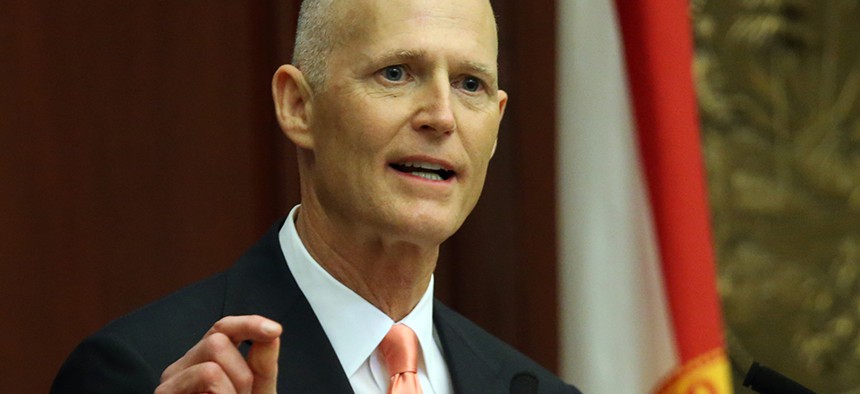Is the Obama Administration Playing Hardball on Health Care?

Steve Cannon/AP
The current debate in Florida over Medicaid funding could be a sign of things to come.
ince 2012, more than 20 states have rejected Obamacare funds to expand Medicaid because of Republican opposition, and the administration has had little recourse beyond rhetoric and a willingness to accommodate alternative programs more palatable to conservatives to change their minds. The states have held all the cards.
Until now.
The feds find themselves with some leverage, intentionally or not, and state lawmakers in one of the biggest holdouts—Florida—are feeling the pressure.
Florida has more than $1 billion in federal Medicaid funding that will expire this summer, and the Centers for Medicare and Medicaid Services has already said that that funding, which helps compensate health care providers that serve a lot of uninsured and low-income Floridians, won't be renewed as is. Legislators are now rushing to take up Medicaid expansion this month.
For some who watch this stuff closely, the administration does seem to be making a play.
The Health and Human Services Department "appears to be using its leverage to try to convince recalcitrant states to do the expansion," said Matt Salo, executive director of the National Association of Medicaid Directors.
Florida might actually be the start of a new round of Medicaid-expansion debates. Texas, the biggest get left for the Obama administration with its nearly 1 million people in the expansion gap, also has some Medicaid funding that helps cover uncompensated care that will run out in 2016.
"I think there's a general question to be asked about, if we continue to have states that haven't expanded Medicaid, if they come in and ask for federal Medicaid dollars that are not tied to people getting coverage. ... That raises a lot of questions for me and many other people," Joan Alker, executive director of Georgetown University's Center for Children and Families, said. "Why would CMS go around handing out large sums of federal Medicaid dollars through that kind of backdoor arrangement in a state that's not expanding Medicaid and guaranteeing coverage for people who really need it?"
Sen. Bill Nelson, a Florida Democrat, suggested something similar last week, according to local reports, based on his conversations with HHS Secretary Sylvia Mathews Burwell. "The money is there under the law," Nelson said, referring to Obamacare's Medicaid-expansion funding. "The federal government is not going to be paying twice."
Now CMS probably isn't demanding that Florida expand Medicaid or else. Those following the situation say that the current program, known as the Low-Income Pool, will likely be renewed in some fashion even if the state expands Medicaid and needs to be reviewed regardless of the Affordable Care Act.
But the expiring $1 billion in federal funding is nonetheless acting as a catalyst for state lawmakers to take up Medicaid expansion. In 2014, CMS approved a three-year extension of Florida's Medicaid managed-care program—but only a one-year extension of the Low-Income Pool, while also requiring an independent study of its effectiveness. That brought the program and its big pot of federal dollars to the forefront of the state budget debate this year.
How significant is that pressure? After Medicaid expansion was stifled in 2013 and all but ignored last year, Florida's Republican-led Senate brought it up almost as soon as its legislative session opened on March 3. They've introduced an expansion plan, which would use Medicaid dollars to pay for private insurance and require small copayments, which the Health Committee approved on Tuesday. It still needs to clear the full Senate and a more skeptical House—but that is major momentum for Medicaid expansion during the first week or so of the legislative session.
"We don't know how this ends, but we want to be prepared for whatever is going to come down the pipe," Florida Senate President Andy Gardiner, a Republican, said in an interview. "I do think the LIP discussion has opened up a bit more dialogue for everybody, that this could be a serious problem if we don't address it."
Florida Gov. Rick Scott certainly appears to believe he's engaged in hardball negotiations. He sent a letter to President Obama last week, warning that if the federal LIP funding was not renewed, he wouldn't use state dollars to fill the budget hole. He also tried to distance the LIP talks from Medicaid expansion.
"This request is not associated with Medicaid expansion in any way," he wrote. "Your administration has already made it clear that whether or not a state expands Medicaid does not impact the continuation of similar programs within that state."
It's easy to imagine why the Obama administration isn't eager to just reauthorize the full LIP funding when Florida could access $50 billion in Medicaid-expansion money over the next decade and provide full health coverage to many of the same people, though it's not publicly taking a hard line.
"CMS is committed to working with the state of Florida to continue to improve Floridians access to high-quality health care," Aaron Albright, an agency spokesperson, said of the negotiations. He wouldn't comment on whether it was pleased that the LIP cliff seemed to have spurred new Medicaid-expansion discussions. CMS's background on the situation did, however, note of the benefits of expanding Medicaid.
Florida is a notable departure from the Medicaid-expansion debates in other states thus far. CMS has generally stretched to accommodate the alternative expansion plans proposed by Republicans in states like Iowa and Indiana. They've allowed states to use Medicaid dollars to pay for private insurance and have accepted small premiums for some enrollees, some of the most popular policies forwarded by conservatives. It has led to hundreds of thousands of low-income people getting covered under Obamacare, a win for the White House, though not as originally envisioned.
Now the Sunshine State might be a preview of the new playbook.
NEXT STORY: Voting technology: Is it secure yet?





